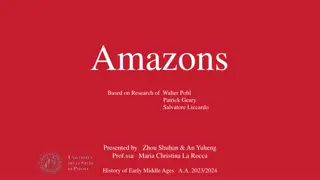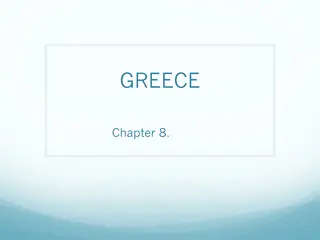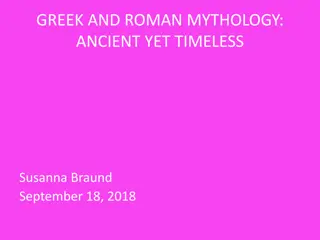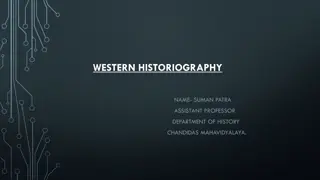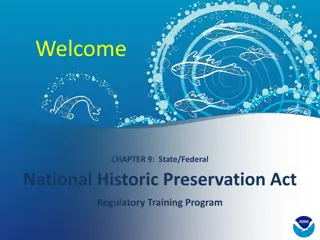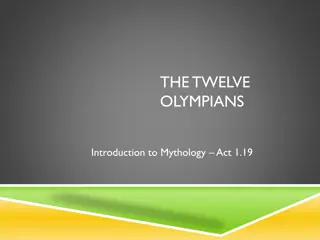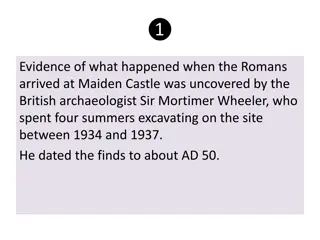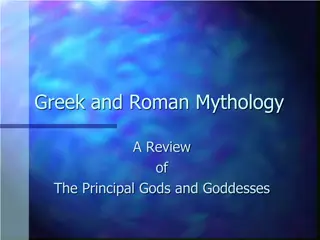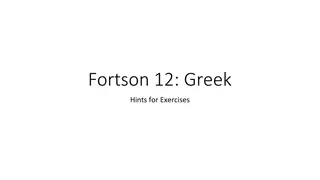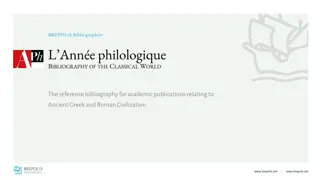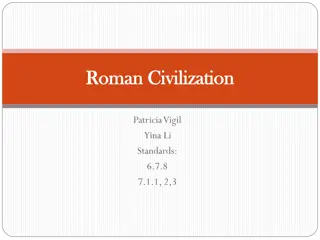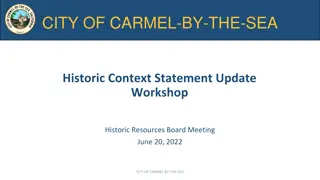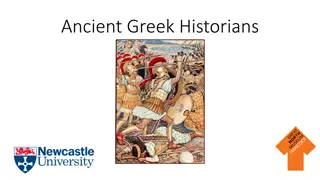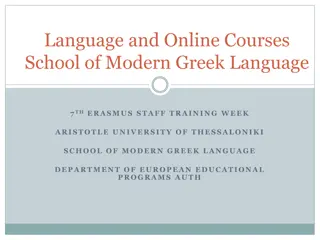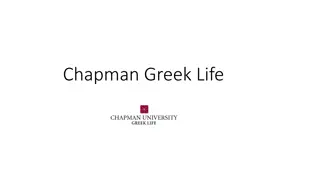Exploring Greek and Roman Historians and Early Historic India
Delve into the world of Greek and Roman historians such as Herodotus, Thucydides, Livy, and Tacitus, analyzing their methods of historical inquiry and writing. Discover the vibrant past of early historic India up to the 6th century B.C., exploring diverse cultural traditions and archaeological sources. Gain insights into the development of Roman historiography and its influence on the genre of moral historiography. Uncover ancient historical methods and literary artistry used in understanding the rich tapestry of history.
Download Presentation

Please find below an Image/Link to download the presentation.
The content on the website is provided AS IS for your information and personal use only. It may not be sold, licensed, or shared on other websites without obtaining consent from the author. Download presentation by click this link. If you encounter any issues during the download, it is possible that the publisher has removed the file from their server.
E N D
Presentation Transcript
Induction Talk Induction Talk Dr. Tridibsantapa Kundu Head, Department of History B.B.College, Asansol 2019
Semester I Semester I Course Course Title Total Credit Total Marks Term End Exam Internal Core 1 6 50 40 10 Greek and Roman Historians Early Historic India (proto history to 6th century B.C) As per your choice other than History Environmental Science Core II 6 50 40 10 Generic Elective I 6 50 40 10 AECC 4 50 40 10 22 200 160 40
Core I Core I: Greek and Roman Greek and Roman Historians Historians Unit I Greek Historiography Module I New form of inquiry (historia) in Greece in the sixth century BCE Logographers in ancient Greece. Hecataeus of Miletus, the most important predecessor of Heredotus Charon of Lampsacus Xanthus of Lydia Module II Herodotus and his Histories 2.1 A traveller s romance? 2.2 Herodotus method of history writing his catholic inclusiveness 2.3 Herodotus originality as a historian focus on the struggle between the East and the West Module III Thucydides: the founder of scientific history writing 3.1 A historiography on Thucydides 3.2 History of the Peloponnesian War - a product of rigorous inquiry and examination 3.3 Thucydides interpretive ability his ideas of morality, Athenian imperialism, culture and democratic institutions 3.4 Description of plague in a symbolic way assessment of the demagogues 3.5 A comparative study of the two greatest Greek historians Module IV Next generation of Greek historians 4.1 Xenophon and his History of Greece (Hellenica) a description of events 410 BCE 362 BCE -- writing in the style of a high-class journalist lack of analytical skill 4.5 Polybius and the pragmatic history 4.3 Diodorus Siculus and his Library of History the Stoic doctrine of the brotherhood of man
Core I Core I: Greek and Roman Historians Greek and Roman Historians Unit II Roman historiography Module I Development of Roman historiographical tradition Quintus Fabius Pictor of late third century BCE and the Graeci annals Rome s early history in Greek. Marcus Porcius Cato (234 149 BCE) and the first Roman history in Latin influence of Greek historiography Marcus Tullius Cicero and the speculation on the theory of history distinguishing history from poetry the genre of moral historiography at Rome Module II Imperial historians 2.1 Livy and the History of Rome a work on enormous scale - Livy s style of writing: honest but uncritical - Livy s comprehensive treatment: details of Roman religion and Roman law 2.2 Tacitus history of the Roman empire - the greatest achievement of Roman historiography ? His moral and political judgements on the past -- a philosophical historian ? Module III Historical methods in ancient Rome 3.1 Research and accuracy 3.2 Literary artistry 3.3 The use of dramatic elements
Core II: Early Historic India Core II: Early Historic India ( (Up to 6 Up to 6th thcentury B.C century B.C) ) Unit I Module- I Understanding early India : Historical theories and interpretations about the Indian past The idea of Bharatavarsha: Indian subcontinent with all its diversity and cultural traditions An overview of literary and archaeological sources Module-II Neolithic to Chalcolithic settlements 2.1The earliest village farming community in India transition from pastoral life to the practice of agriculture: Mehrgarh and its various cultural phases 2.2The first urbanization in the Indian subcontinent Indus civilization: contemporary perspectives through a historiography 2.3The early Harappan, Harappan and late Harappan phases: technology, architecture, religion and maritime trade. 2.4 End/transformation of the Indus civilization: different theories. Module-III The Aryans in India: Vedic Age 3.1 The historiography of the concept Aryan 3.2 The spread of Aryan settlements in India 3.3 The period of the Vedas, Brahmanas and Upanishads: pastoralism, agriculture and other occupations 3.4 Political development, culture and rituals Module-IV North India in sixth century BCE 4.1 Establishment of kingdoms, oligarchies and chiefdoms: sixteen Mahajanapadas 4.2 The autonomous clans 4.3 Rise of Magadhan imperialism
Core II: Early Historic India Core II: Early Historic India (Up to 6 (Up to 6th thcentury B.C) century B.C) Unit II Module I Ideas and institutions in early India Varna and Jati: the issue of upward mobility among the Shudras Slavery: ancient forms and modern debates Untouchables Women Forms of marriage Module II Cults, doctrines and metaphysics 2.1 The religion of the Vedas 2.2 The unorthodox sects Buddhism, Jainism and the doctrine of the Ajivikas 2.3 Scepticism and materialism Module III Aspects of economy in the age of Buddha 3.1 Economic changes: use iron, rural economy, trade and crafts, guilds 3.2 Taxation 3.3 The second urbanization Module IV The cultural milieu 4.1 Education 4.2 Language and literature 4.3 Science and technology
THME TABLE SEMESTER I 10-11 11-12 GE I 12-1 EVS 1-2 Core I AH Core I AH Core I SS Core I KR Core I KR Core I/TU 2-3 Core II SC Core II SC Core II TSK Core II TSK Core II SS Core II/TU 3-4 Mon Tue GE I Wed GE I Thrus GE I Fri GE I EVS Sat GE I
Distribution of Unit/Module Course Core I Unit/ Module Unit I/Module 1 Unit I/ Module 2-4 Course Tutor S.Sidharth K Roy Unit II/ Module 1-3 A.Halder Core II Unit I: Module 1-4 S. Chakraborty Unit 2/ Module 1-3 Unit 2/ Module 4: T.S.Kundu S.Sidharth
What is History What do you mean by history? Is history solely deals with the past? Why should we study history? What is the utility of history?
Methods of History How history is reconstructed? What are the basic elements of the reconstruction of history What is the role of a historian is this process? Why the historians differ in their opinion in a particular event/ topic? Can history be fully objective? What precautions should be taken by a historian to be objective?
Historiography What do you mean by historiography What is the difference between history and historiography Why should we study historiography
The utility of history Is there any practical use of history? Can our understanding of past help us in understanding the present? Can history predict or forecast the course of history?
End of History or a new kind of History Have you heard the concept of end of history What does it actually mean
Post modern History/Histories What is the intellectual impact of Post modernism on history? History or histories? Do you think that history will collapse with modernism as it was a by-product modernism. What is the future of history?
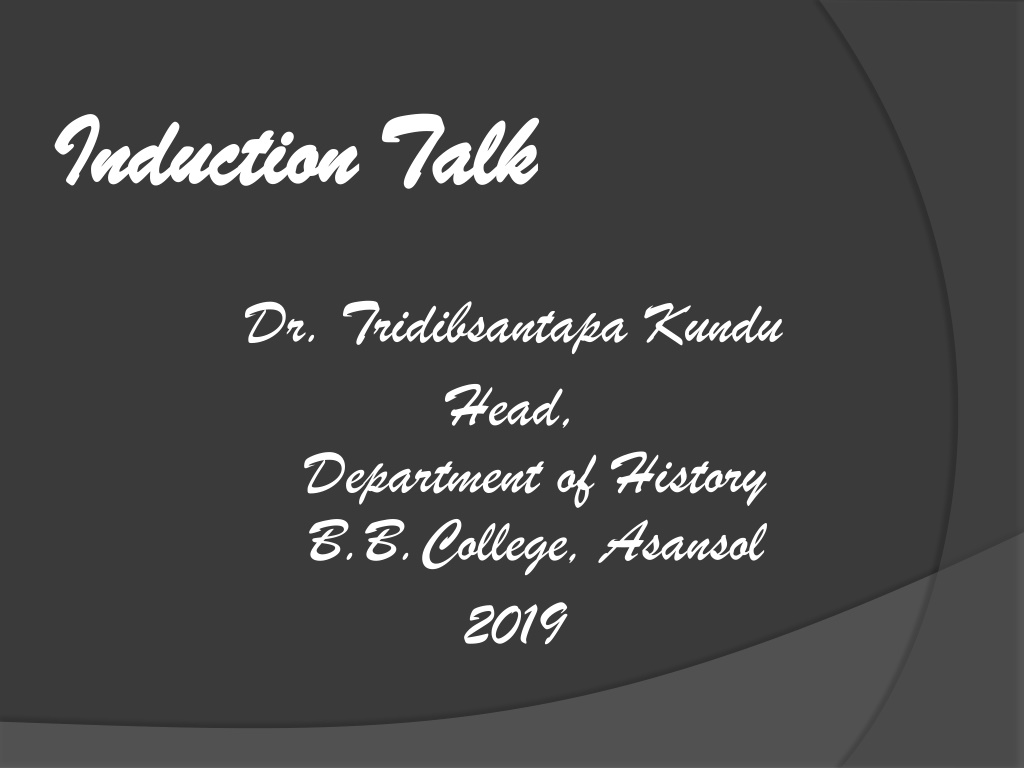

![READ⚡[PDF]✔ European Mail Armour: Ringed Battle Shirts from the Iron Age, Roman](/thumb/20552/read-pdf-european-mail-armour-ringed-battle-shirts-from-the-iron-age-roman.jpg)




